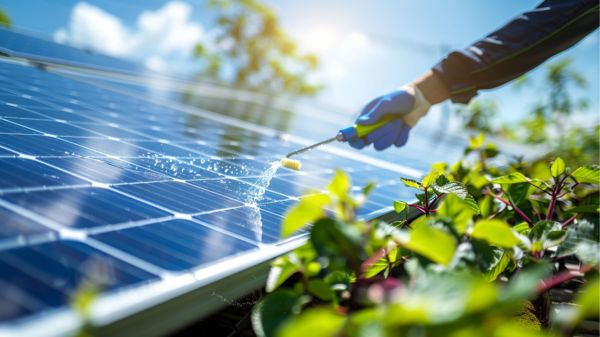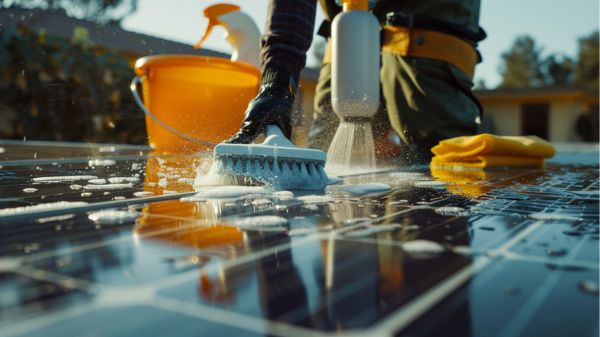Best Practices for Home Solar System Maintenance: Expert Guide
Maintaining a home solar system is essential to guarantee its efficiency and longevity, but many homeowners are unaware of these best practices for home solar system maintenance. From cleaning the panels to monitoring performance, each aspect plays a significant role in optimizing energy production.
Regular inspections and addressing any physical damage promptly can make a substantial difference. Additionally, understanding the importance of safety devices and engaging professionals for routine checks can further safeguard your investment.
Discover how each of these tips can collectively enhance your solar system’s performance and efficiency, making the most of your renewable energy setup.
Clean Your Solar Panels
Regular maintenance, including the careful cleaning of your solar panels, is essential to guarantee maximum energy efficiency and longevity of your home solar system.
Cleaning solar panels is a critical task that can increase energy production by up to 21%, greatly impacting the overall performance and cost-effectiveness of your system.
It is recommended to maintain solar panels by cleaning them at least twice a year to make sure they remain free from dirt, dust, and debris. Using a soft brush or sponge with water is the safest method to clean the panels.
This approach effectively removes accumulated grime without causing damage. Avoid using abrasive cleaners or high-pressure water, as these can scratch the surface or compromise the integrity of the panels, leading to reduced efficiency and potential long-term damage.
Performing these cleaning routines not only ensures peak energy output but also contributes to the prolonged life of your solar investment. Dirty panels suffer from diminished sunlight absorption, which directly translates to lower energy production.
By adhering to these careful and regular cleaning practices, you safeguard the efficiency and durability of your solar system, ensuring it operates at its highest performance.
Monitor System Performance
Implementing a reliable solar panel monitoring system is essential for tracking daily energy production levels and identifying any potential issues promptly. Effective solar panel monitoring guarantees that your system operates at peak efficiency, providing both environmental and economic benefits.
By regularly reviewing real-time data on your system’s performance, you can quickly detect and address anomalies that could indicate shading issues or equipment malfunctions.
To optimize the monitoring process, consider the following:
- Install a high-quality monitoring system: Choose a system that offers detailed data on energy production, usage, and potential inefficiencies.
- Set up alerts for performance drops: Configure your monitoring app to notify you of any significant decreases in energy output, enabling timely intervention.
- Review performance data consistently: Regularly check the monitoring system to track system performance trends and identify any deviations from expected output.
- Analyze shading patterns: Utilize the monitoring data to detect any new shading issues caused by growing trees or other obstructions and take corrective actions.
- Schedule periodic maintenance: Use the insights from your monitoring system to plan and execute routine maintenance, ensuring sustained performance.
Check for Damage
To guarantee peak performance and safety, conduct thorough inspections of your solar panels to identify any physical damage such as cracks, chips, or scratches. Regularly inspecting your solar panels for these issues is vital, as even minor defects can greatly impact the efficiency of your system.
Additionally, look for signs of corrosion or water damage on panel components, which can compromise structural integrity and performance.
During your inspection, check for loose connections or wiring issues. Faulty electrical connections can lead to system malfunctions or pose safety hazards, potentially resulting in reduced energy production or even electrical fires.
Any damage identified should be addressed promptly to prevent further complications and ensure continued excellent performance.
While self-inspections are beneficial, enlisting professional maintenance services can provide a more thorough evaluation. Professionals possess the necessary expertise to identify and repair damage effectively, often catching issues that may not be apparent to the untrained eye.
Regular professional maintenance not only aids in the immediate identification and resolution of damage but also contributes to the longevity and efficiency of your solar power system.
Schedule Regular Inspections
Scheduling annual inspections with a certified professional is essential for ensuring the top-notch performance and longevity of your home solar system. These inspections should include checks for physical damage, assessments of panel cleanliness, and thorough examinations of electrical components.
Regular inspections help identify potential issues early, thereby maintaining warranty coverage and preventing more significant problems in the future.
Check for Damage
Regular professional inspections are crucial for identifying physical damage, loose connections, and potential system inefficiencies in your home solar system. These inspections are essential for maintaining system health and preventing minor issues from escalating into significant problems.
A thorough inspection typically involves a detailed assessment of various components to maintain performance and safety.
Key areas to focus on during inspections include:
- Physical Damage: Inspect panels for any cracks, chips, or discoloration. Such damage can severely impact the efficiency of your solar system.
- Loose Connections: Ensure that all electrical connections are secure. Loose connections can lead to energy loss and pose safety risks.
- Overall System Health: Regularly check the inverter and other critical components for signs of wear and tear to sustain system integrity.
- Shading Issues: Identify any new shading from nearby trees or structures that could affect the panels’ exposure to sunlight.
- Environmental Wear: Look for signs of environmental wear, such as corrosion or weather damage, which can compromise the system’s longevity.
Assess Panel Cleanliness
Maintaining the cleanliness of your solar panels is essential for ensuring peak energy production and system efficiency. Regularly scheduled inspections are pivotal to prevent dirt and debris buildup, which can greatly reduce the panels’ ability to absorb sunlight.
An annual inspection should be a standard practice, although more frequent checks may be necessary in areas prone to heavy dust, bird droppings, or other environmental factors.
Monitoring the panels closely allows for early detection of cleanliness issues that could impair performance. Debris buildup on the surface of the panels can create shading that diminishes energy output.
As such, cleaning the panels at least twice a year is recommended to maximize efficiency and extend the lifespan of the solar system. Use non-abrasive materials and water to ensure that the cleaning process does not damage the panels.
Furthermore, routine maintenance and inspections can help identify and mitigate potential shading issues caused by overgrown vegetation or nearby structures.
Inspect Electrical Components
In addition to maintaining panel cleanliness, it is important to conduct thorough inspections of the electrical components within your home solar system to guarantee peak performance and safety.
Annual inspections are essential for identifying and addressing any potential electrical issues before they escalate into costly repairs or safety hazards.
By scheduling regular inspections, you ensure that professionals can meticulously inspect electrical components such as inverters, wiring, and connections, thereby maintaining the system’s efficiency and reliability.
Key points to take into account when inspecting electrical components include:
- Inverter Performance: Make sure that inverters are functioning correctly, as they are essential for converting DC to AC power.
- Wiring and Connections: Check for any signs of wear, corrosion, or loose connections that could impede electrical flow or cause hazards.
- System Monitoring: Regularly review system performance data to detect any anomalies that may indicate underlying electrical issues.
- Safety Devices: Verify the condition and functionality of safety devices such as fuses and breakers to prevent electrical failures.
- Professional Assessment: Engage qualified professionals to perform thorough inspections, leveraging their expertise to identify and rectify issues effectively.
Avoid Harsh Cleaners
To guarantee the longevity and efficiency of your solar panels, it is critical to avoid using harsh cleaners that can damage their protective coating. Proper maintenance is essential for peak energy production, and gentle cleaning practices are key to preserving the integrity of your solar panels.
Harsh cleaners, including ammonia-based solutions and abrasive materials, can erode the protective layer, leading to reduced efficiency and potential damage over time.
For routine maintenance, it is advisable to use a mixture of warm water and mild soap. This solution is effective yet gentle, ensuring that the panels remain clean without compromising their protective coating. Avoid high-pressure washing, as the force can cause physical damage to the delicate surfaces of the solar panels.
Regular gentle cleaning helps maintain the panels’ performance, ensuring they operate at maximum efficiency. Use a soft cloth or sponge to apply the mild soap solution, and rinse thoroughly with clean water. This approach not only extends the lifespan of the panels but also maximizes energy output, contributing to a more sustainable and cost-effective home solar system.
Protect From Weather
Shielding your solar panels from extreme weather conditions is paramount to preserving their efficiency and longevity. Solar panels, while designed to withstand a variety of weather conditions, can suffer damage from severe elements such as hail, snow, and high winds. Implementing preventative measures will help maintain peak energy production and extend the lifespan of your solar system.
Consider the following strategies to protect your solar panels from extreme weather:
- Hail Guards and Protective Coatings: Installing hail guards or applying protective coatings can provide a critical shield against impact damage from hailstones, which can greatly reduce the efficiency of your panels.
- Snow Removal: Regularly inspect your panels for snow accumulation. Removing snow promptly ensures that the panels can continue generating electricity without interruption.
- Secure Mounting: Ensuring that all panels and mounting components are securely fastened can mitigate the risk of damage due to high winds during storms.
- Weatherproofing: Using high-quality weatherproof materials and sealants around the panels and electrical components can prevent moisture ingress and other weather-related damage.
- Routine Inspections: Conducting regular inspections during and after extreme weather events can help identify and address potential issues before they escalate.
Hire Professional Services
Opting for professional solar maintenance services guarantees that your solar system operates at peak efficiency and longevity, with experts equipped to handle intricate inspections, component testing, and system optimization.
Professional services, typically costing around $450 annually, provide expert care that is essential for maintaining the top performance of your solar system. By entrusting professionals, homeowners can prevent future repairs and ensure the system runs smoothly and efficiently.
Expert care includes meticulous inspections of solar panels to detect any physical damage or dirt accumulation that could impede performance. Professionals also test various components such as inverters, wiring, and connectors to ensure they are functioning correctly and safely.
System optimization, a critical aspect of professional maintenance, involves adjusting settings and configurations to maximize energy output and efficiency.
Hiring professionals not only saves time and effort but also leverages their specialized knowledge to efficiently identify and resolve any issues.
It is advisable to research and select a reputable maintenance company, such as RxSun, known for delivering high-quality care and sustainable energy solutions. By doing so, homeowners can ensure their solar systems are well-maintained, safe, and efficient, thereby maximizing their investment.
Related Post: Best Tips for Optimizing Solar Energy Storage for Homes.
Conclusion
Ensuring the best performance and longevity of a home solar system necessitates diligent care and maintenance. Regular cleaning with appropriate tools and materials can greatly enhance energy production. Continuous monitoring, routine inspections for damage, and addressing shading issues are critical for system efficiency.
Employing gentle cleaning methods to avoid panel damage and scheduling professional maintenance services further safeguard the system. Prioritizing safety by verifying safety devices and engaging qualified professionals is essential for the system’s sustained functionality.


One Comment
Comments are closed.